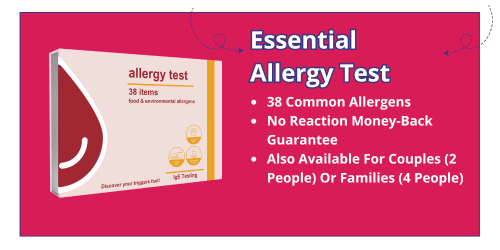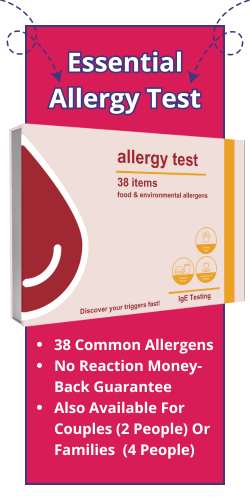
We put onions in most of our meals, be it cold salads or warm curries and stews. They add a broad base of flavour to all foods. However, if you’re allergic to onions, you may need to eliminate them from your recipes because they can result in allergy symptoms that can sometimes be life-threatening. Some people have a raw onion allergy, so the smell or contact with raw onions can result in symptoms of onion allergy.
Onions belong to the genus allium, and if you have an allergy to onions, you’re most likely allergic or sensitive to other plants in this family. There are even other plants in the allium family that aren’t edible but are used for ornamental purposes, and these too can result in allergy symptoms in some individuals. When you’re allergic to onions, it can be difficult to avoid foods that contain this ingredient or other plants from the allium family, and most people find it easier to prepare their own foods. In this guide, we’ll discuss symptoms of onion allergies and how to manage them.
Onion allergy symptoms
If you’re allergic to onions, you may experience a few internal or external symptoms ranging from mild to severe. The onset of symptoms varies from one person to the other and in severity. Some people experience symptoms immediately when they eat, touch, or smell onions, while others may not experience symptoms for several hours{1}. The most common symptoms of onion allergy include:
- Itching and tingling in the mouth
- Swelling of lips, tongue, lips, face, or throat
- Difficulty breathing
- Nasal congestion
- Stomach pain
- Diarrhoea
- Gas
- Hives or rashes all over the body
- Nausea and vomiting
The above symptoms are often mild and resolve once the consumed onions leave your system. These symptoms also typically respond well to home treatment, so you shouldn’t be too worried. But if you experience moderate symptoms when it comes to the gastrointestinal tract like vomiting and diarrhoea that doesn’t stop, then there’s a need to visit a doctor.
In severe cases, one may experience anaphylaxis. Even though it is rare, anaphylactic shock can occur in someone who is severely allergic to onions. The occurrence of anaphylaxis is more likely when the onions are raw or partially cooked{2}. If someone experiences anaphylaxis, it is best to immediately take them to the hospital. They should also always carry an EpiPen with them for emergencies. Symptoms of anaphylactic shock include:
- Confusion
- Dizziness
- Trouble breathing
- Loss of consciousness or fainting
- Sweating
- Low blood pressure
- A feeling of impending doom
The difference between onion allergy and sensitivity
Having a true onion allergy is relatively rare but not impossible. If you’re allergic to onions, the immune system mistakes the proteins in it for ‘harmful substances’ and releases chemicals like histamine. These chemicals often cause a myriad of symptoms, ranging from mild to severe. But onion intolerance occurs quite differently. First off, there is no involvement of the immune system, but rather the gastrointestinal tract takes the fall. Onion intolerance or sensitivity is often caused by the inability of the intestines to digest or process certain foods.
Even though onion allergy and intolerance are pretty different, you may find overlapping symptoms that may cause you not to be sure what you’re suffering from. That’s why we recommend using an Allergy and Intolerance Test if you’re unsure which of the two is causing you trouble. Another difference between onion allergy and sensitivity is the severity of the symptoms. While onion allergy may cause anaphylactic shock (in rare cases), onion sensitivity can never result in such life-threatening symptoms. Onion sensitivity only causes digestive problems; once you pass the onions, you’ll be fine.
Symptoms of onion sensitivity also depend on the number of onions one consumes. The more onions you eat, the more severe your symptoms will be. But if you eat very small amounts, there will be less severity. This concept doesn’t apply to onion allergies. No matter how small an onion you consume, as long as you’re allergic, you will experience allergy symptoms.
Onion and garlic allergy
If you’re allergic to onions, it is possible to be allergic to garlic, too, because these two spices are from the genus allium. Doctors often refer to this as cross-reactivity. Garlic and onions contain the same type of proteins that the immune system thinks are invaders and often lead to allergy symptoms. If one is allergic to these two, they may also be allergic to, or have an intolerance to other alliums.
Onion allergy treatment
It is impossible to cure a food allergy as an adult, and you may have to learn how to manage it to live with it. Children often outgrow food allergies once they approach teenagehood. Even though you can’t cure an allergy, you can always manage its symptoms. There are different types of treatment for allergy symptoms depending on severity. Treatments for onion allergy include:
- Aloe Vera: If you have itchy hives, aloe vera can do an excellent job calming them down, even though it can’t help reduce histamines level in your body.
- Antihistamines: You can find these available as sprayed medications or oral. This medication blocks histamine production, which can reduce or eliminate minor allergy reactions.
- Epinephrine: This autoinjector is used in treating anaphylaxis.
- Hydrocortisone cream: Topical use of this cream can help reduce itching and inflammation.
- Albuterol sulphate inhaler: This bronchodilator helps increase airflow through the bronchial tubes.
Even though food allergies can’t be cured, they are manageable as long as you avoid the problematic food. Considering onions aren’t among the top allergens, the FDA doesn’t require food manufacturers to list them as an ingredient. However, the FDA requires all manufacturers to list food ingredients, and this may be helpful for you. If you aren’t sure whether what you’re buying has onions or not, call the manufacturer, and they’ll be more than willing to let you know.
To keep yourself safe, you may need to:
- Avoid foods that could have come into contact with onions or onion products.
- Avoid eating any foods that could contain onion derivatives, like onion powder.
- Avoid dwelling around people chopping or cooking onions
- Avoid eating meals in restaurants that could have been on shared equipment or utensils with onions.
Onion allergy testing
If you experience symptoms every time you consume onions, garlic or other plants from the allium family, you may be sensitive to alliums. If you feel this way, you should have your doctor conduct tests in case you may have certain underlying conditions leading to allergy-like symptoms. If you want to test for a possible allergy at home, then you can order a Allergy and Intolerance Test. This test will measure the level of immunoglobulin E (IgE) antibodies present in your system and analyse it in the laboratory to determine the allergens your body is reacting towards. If you find that you’re allergic to onions, you will need to keep away from this food.
Foods to avoid: Onion allergy
If you realise that you have an onion allergy, you may need to avoid plants and substances with similar proteins to onions. For example, since there is a known cross-reactivity, you need to avoid all edible alliums in your diet, which include:
- Chives
- Garlic
- Scallions
- Shallots
- Mugwort tea
Avoiding these ingredients may be challenging but not impossible. You’ll need to be vigilant. Ensure you carefully read food labels on prepared, packaged, and processed foods. Most alliums are labelled as “seasonings” on ingredient lists. When in doubt, call the manufacturers for clarity. It is also common to find onions and similar ingredients in foods like:
- Deli meats
- Frozen entries
- Flavoured cheese
- Salsa or Pico de gallo
- Frozen entries
- Crackers
- Premade soups and sauces
- Flavouring packets
- Broths
- Frozen or premade pizza crust
Alliums also belong to the amaryllis plant family, which contains many flowers and varieties of lilies. So, you’ll need to look out for plants and flowers that you may be allergic to and avoid them.
Food substitutes for onion allergy
Even though it may seem impossible to eat foods without onions and other seasonings that are alliums, it’s not. You will find other alternatives that will spice up your foods, giving you a similar taste without risking your life. These include:
- Asafoetida
- Radish
- Fennel
- Celery
- Low FODMAP foods and spices
Final thoughts on onion allergy
It is rare to have a true onion allergy and even more so to experience anaphylactic shock because of it. However, sensitivities are common. But if you’re allergic to onions and sensitive to other alliums, we advise you to eliminate these foods from your diet. You may use other alternatives to spice your dishes. Being allergic to onions may open up a myriad of possible allergies, especially to other plants and flowers that are alliums, and an Allergy and Intolerance Test is essential. By learning what plants trigger your allergies, it will be easier to avoid them and live without any symptoms.
References
- Wright, B. L., Walkner, M., Vickery, B. P., & Gupta, R. S. (2015). Clinical Management of Food Allergy. Pediatric clinics of North America, 62(6), 1409–1424. https://doi.org/10.1016/j.pcl.2015.07.012
- Arena, A., Cislaghi, C., & Falagiani, P. (2000). Anaphylactic reaction to the ingestion of raw onion. A case report. Allergologia et immunopathologia, 28(5), 287–289.







